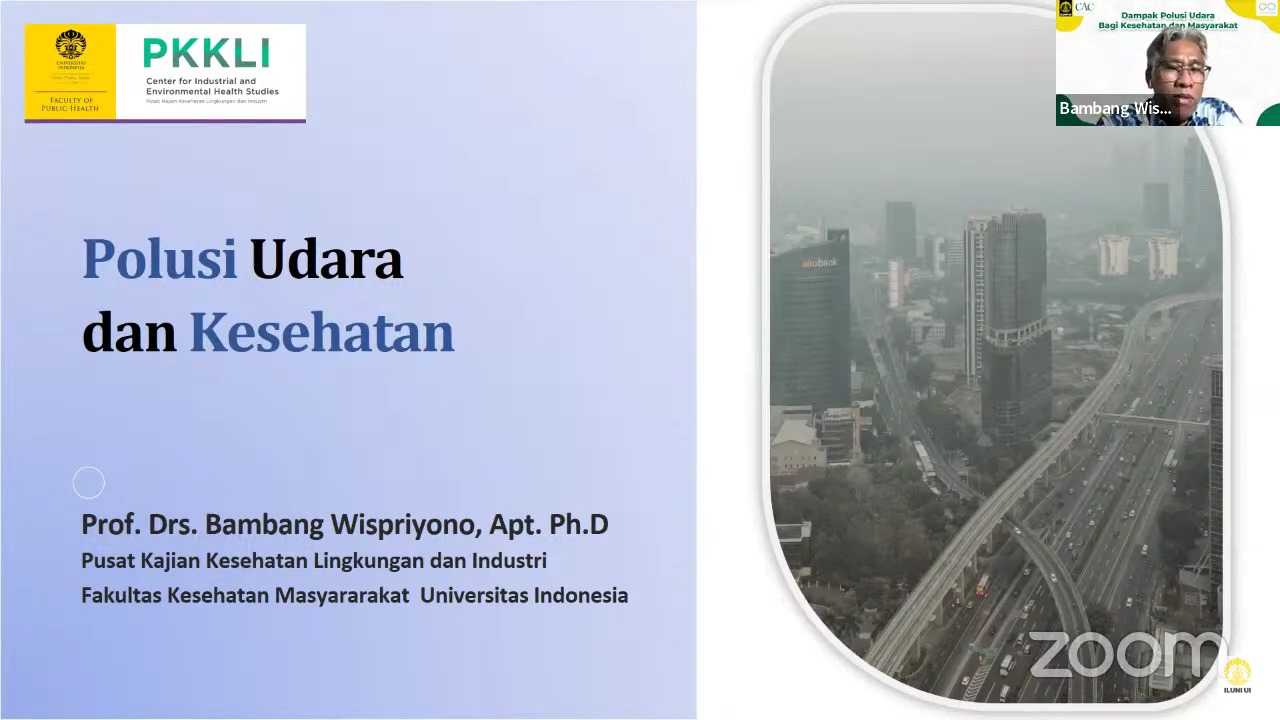
On Saturday, September 23 2023, Professor of Environmental Health, Faculty of Public Health (FPH) Universitas Indonesia (UI), Prof. Drs. Bambang Wispriyono, Apt., Ph.D., was a speaker in a webinar organized by ILUNI UI, together with other speakers, namely dr. Dewi Puspitorini, Sp.P(K), MARS., M.H. In the webinar with the theme “The Impact of Air Pollution on Public Health”, Prof. Bambang explained material starting from the causes of air pollution, its impact on health, to recommendations for steps that can be taken.
Air pollution and its impact on health is an issue that is widely discussed by the public. In 2019, there were 4 million deaths recorded worldwide caused by air pollution. This figure is expected to increase by 256% by 2045. Air pollution is dangerous for humans because it contains emissions from natural and anthropogenic sources. The forms of pollution agents can be physical particulates, chemical gases, and metals, or microbiological such as viruses and bacteria.

The risk of air pollution is influenced by hazard (danger), vulnerability (susceptibility) and exposure (exposure). “This risk can also increase due to human activities, such as development, humans who cannot adapt to the existing environment, and government policies that do not environmentally friendly,” said Prof. Bambang. The risk of air pollution to humans is influenced by several things, namely the size of dust particulates, the content and concentration of pollutants in the air, the duration and frequency of exposure, a person’s health condition, and the dispersion of air pollutants into water until they enter the food chain. Air pollution itself can have short-term and long-term impacts, ranging from irritation to chronic disease.

According to Prof. Bambang, air pollution cannot only be viewed from a public health perspective, but planetary health. From a planetary health perspective, the problem of air pollution is seen as an ecological dependency that connects health with the vitality of individuals, communities, and the earth’s natural systems. Planetary health is also influenced by social, political, economic, environmental, and cultural aspects.
“For this reason, a solution is needed with an emissions control and risk reduction framework. The first thing to focus on is conducting air quality assessments and air quality-based disease research. “The results of this assessment can later be adapted into risk management, health promotion strategies, medical technology, mitigation plans, as well as regulations and policies,” explained Prof. Bambang. Apart from that, Prof. Bambang also provided recommendations for overcoming air pollution through regulations, techno-ecological, socio-economic and health. Some examples of countermeasures in terms of regulations include the government being able to set limits on air quality standards and tighten permits for activities that have the potential to cause air pollution. Technology can be used to create effective monitoring systems and more environmentally friendly fuel alternatives. From a socio-economic perspective, emissions taxes, education about pollution and increasing green investment can be implemented. Meanwhile, the health sector plays a role in reducing the risk of air pollution to humans by increasing public knowledge and awareness of air pollution issues. (WR)

